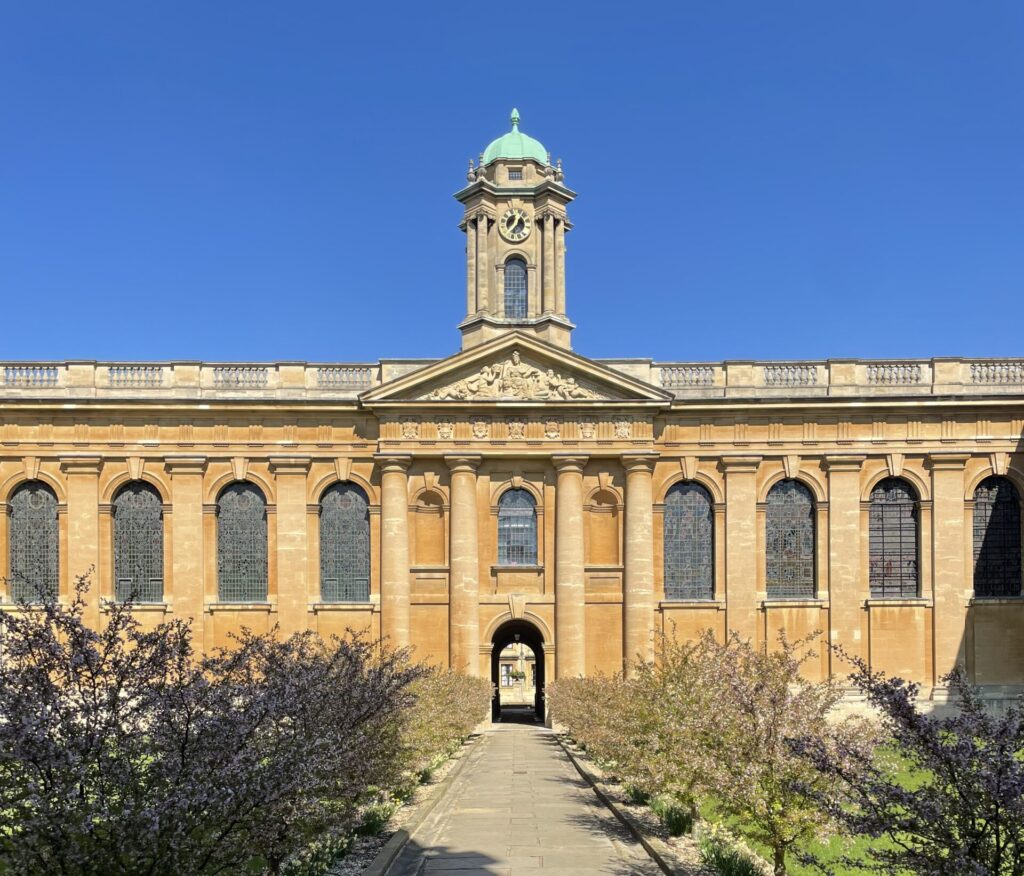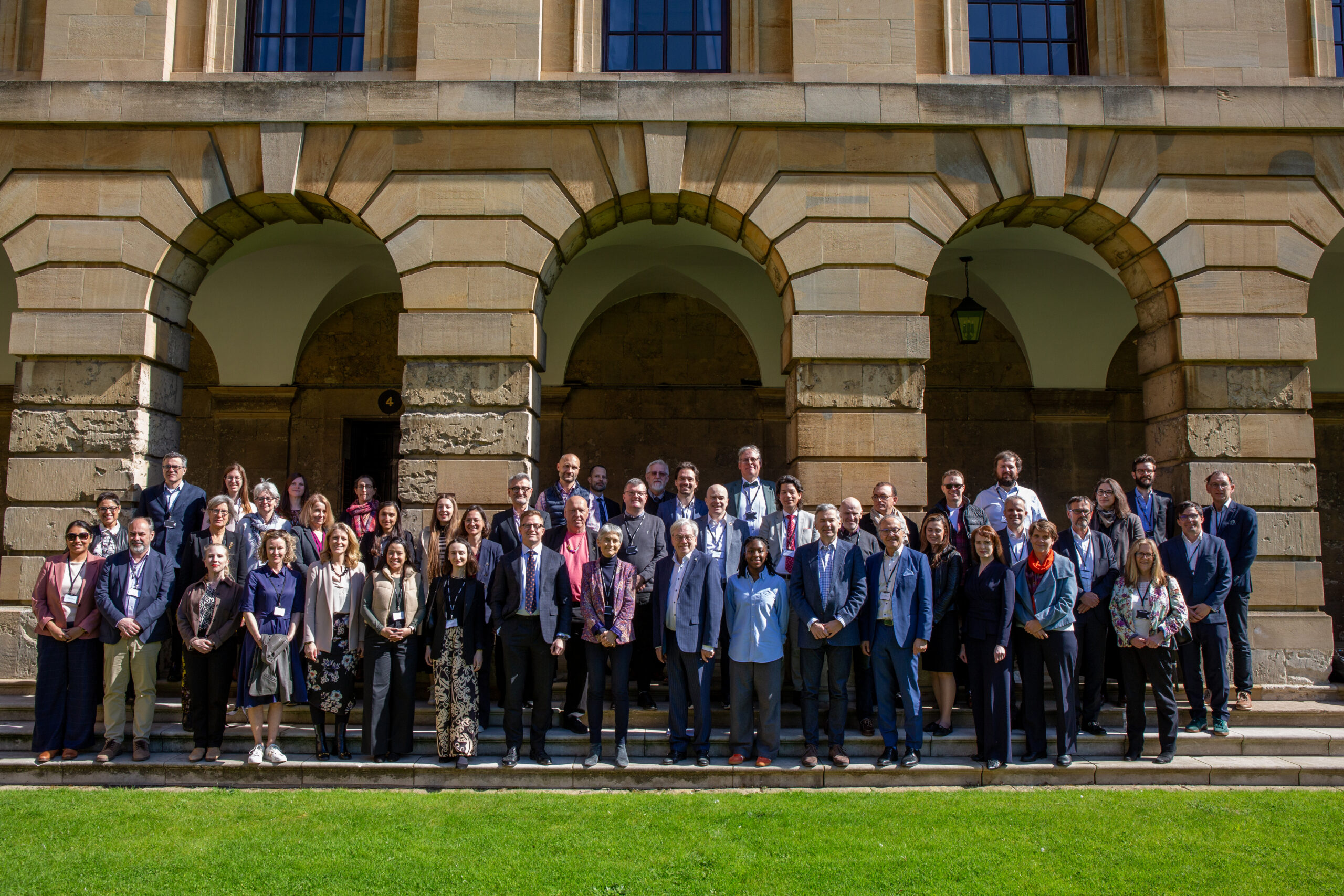INGSA-Europe inaugural conference: Science advice across boundaries

The European Chapter of the International Network for Governmental Science Advice (INGSA-Europe) held its inaugural conference on 31st March – 1st April 2025 at The Queen’s College Oxford, UK over two sunny days framed by magnolia trees in peak blossom. Queen’s provided a beautiful and storied backdrop for hard conversations at a pivotal time for scientific advice, both globally and across Europe.
Historically, moments of global crisis have tended to prompt an increase in the demand for and uptake of scientific evidence to support rapid, high stakes decision making, with the Covid-19 pandemic being the most recent example of this. Today, almost daily shifts in the geopolitical landscape, alongside enduring national tensions and the intensification of socio-political, environmental and technological challenges seems to be having the opposite effect. Consequently, concerns regarding diminished trust in institutions and experts as well as future development of policy relevant science and technology, which has long relied on international collaboration and knowledge exchange, have reemerged.
In this context, as well as drawing on existing evidence and best practice in science advice, each session was accompanied by more practical and forward looking discussions. Participants aimed to identify actions scientific advisors, and networks like INGSA-Europe that seek to support them, could take to ensure hard won relationships between science, policy, decision making and society are made robust and adaptable enough to respond to the challenges of an increasingly unstable world. Encouragingly, despite the many uncertainties we face, some directions did emerge both for individual actions and for INGSA-Europe’s programme over the next two years.
Trustworthiness and knowledge security
The first conference session drew together the extensive work on Trust and Trustworthiness, and the third session discussed the interrelated topic of Knowledge Security, exploring their implications for science advice. Well placed between these topics was our session on Early and Mid-Career researchers which reaffirmed the importance of their involvement in discussions as well as the practice of science advice.
Emerging themes included: maintaining the openness and integrity of scientific advice amidst declining geopolitical stability and the rise of AI, the importance of consistently demonstrating trustworthiness (including reckoning with values), choices around proximity and/or independence, and protecting the right for researchers to participate in responsible advocacy around urgent policy issues.
Basic factors underlying how to build trust and be seen as trustworthy are extensively studied and reasonably well known: particularly to do with competence, reliability and aligned values. These factors have major implications for the conduct of science and of science funding. However, for science advice, they take specific twists. In particular, when governments are making decisions without strong public consensus, and when differing values or disagreements between communities, scientists themselves, or within established advisory systems, become more visible, the role of the advisor becomes even more complex. In such situations, staying true to one’s principles, and being transparent about what that means may be more important than ever.
What do you do when a Minister says “I don’t believe you”, on a matter of scientific evidence?
This challenging question, recently asked by a Minister of one of the scientists attending, crystallises emerging tensions and choices for advisors aiming to act as an ‘Honest Broker’. Honest Brokering becomes increasingly challenging when it involves more parties, particularly when there is little desire to collaborate. As is so often the case with science advice the individual, institutional and systemic contexts vary greatly by country and by issue. While some general principles hold across settings, advisors frequently face highly context-specific decisions that require careful navigation.
What makes INGSA unique is that it brings together this diversity. It is probably one of the few spaces where Presidents of National Academies and individuals embedded in formal European advisory systems can sit down with members of science activism groups advocating for lawful civil protest.
One general conclusion which came through during conference discussions, was that good science advice must be embedded across both political and scientific systems. This requires a range of actors, each making different choices about the roles they play and often moving between positions over time. It’s in this dynamic ecosystem that robust, context-sensitive, and trusted advice can take root.
The impact of language, culture and context
The conference also included breakout sessions conducted in French and German, rather than using English throughout. Reflections from these multicultural and multilingual groups emphasised insights from the literature and INGSA-Europe’s early work on language and culture on the provision and use of science advice (the INCLUSIVE project) including the positive emotional connection felt when discussing a topic in your native language and the increased capacity for inclusive discussion.
However, the dominance of English in the research and practice of science advice (and research generally) highlighted several important considerations. Participants noted that translating discussions to and from English encouraged specificity and patience to ensure clarity and mutual understanding but there were challenges around translation in both directions. For example, from a discussion about translations of “trust” a debate evolved about the meaning of “proximité” in the French-speaking group. This struck a chord back in the English-speaking plenary, as encapsulating the heightened emotion surrounding choices about how “close” to decision-makers advisors could or should be. This line of enquiry in turn led to a productive discussion about how to act with integrity in different settings. Additionally, as highlighted in the INCLUSIVE project, any choice of language brings with it heightened visibility of different cultural or institutional mindsets.
Including Early and Mid-Career Researchers
The other major theme of the conference was directly discussed in the second session, on Early and Mid Career Researchers (EMCRs). Led by a mix of EMCRs and more established practitioners, the session focussed on highlighting case studies that illustrate the value of EMCR involvement in science advice, barriers to engagement and how can they be overcome and what well-established scientists can do to best support EMCRs.
Participants reflected on how valuable it was to have EMCRs made a central part of the conference programme. Importantly, the contributions of EMCRs throughout all the discussions itself led to clear demonstrations of the ways in which engaging EMCRs in science advice is not just building capacity for the future when they can take more “senior” roles, but is also a means to improve scientific advisory systems today. Because many established norms are under threat, or have changed, it was apparent that having people who are less immersed in what has gone before, often at the leading edge of research in their field and closer to the policy and social contexts for which advice is most urgently needed, helps keep discussions flexible, brings in new ideas and a sense of agency.
However, despite general agreement about the positive roles EMCRs can and do play, they continue to face stark challenges when attempting to participate in the science for policy ecosystem. The now familiar structural challenges within higher education systems around recognition, reward and support for policy engagement activities remain. Further, while several excellent initiatives for training and capacity building have been developed in recent years, they are not always sufficiently visible to EMCRs and are not evenly distributed or accessible across Europe.
An interesting insight emerging from the global nature of INGSA’s network concerned the specific challenges posed by increased international mobility in the early part of an academic career. Studying or undertaking research abroad can be essential to expand an academic’s professional research networks and broaden academic or cultural perspectives. However, being a foreign resident, often short-term, and perhaps not being wholly fluent in the national language(s) can make it more difficult to take part in national science advisory activities without explicit support from senior practitioners already active within them.
What next for INGSA-Europe?
As we plan our next steps, we remain committed to building on INGSA’s strengths as a hub for informed and informal discussion and being a link between INGSA’s global networks and pan-European science for policy stakeholders at any career stage. Crucially, we will only advance initiatives that allow us to collaborate with, or add value to, the excellent work already taking place across the region. In doing so, we also aim to contribute to INGSA’s broader mission of capacity building by rolling out or adapting well established practices and knowledge to new contexts and responding nimbly to changes in the science advice ecosystem.
The two days spent together felt productive and, surprisingly, hopeful. They offered a powerful reminder of the importance of knowledge exchange, open dialogue and collaboration – especially in times of increased complexity and uncertainty. We would again like to say thank you to colleagues for taking the time to attend the conference and for your considerate suggestions regarding the future of INGSA’s European Chapter.
Joining INGSA
If you would like to join INGSA’s global community you can do so here: https://ingsa.org/join/.
INGSA is an open-access network so is free to join. Members will receive quarterly updates about news, events, and opportunities right across INGSA’s global network (including INGSA-Europe’s activities). Members are also able to sign up to any applicable Thematic Division of interest. You are welcome to join on an individual basis rather than on behalf of your institution.
Conference pre-reading
A collection of material assembled to inform discussion on the conference topics
Session 1:
Trust and trustworthiness
- Cologna, V, Mede, N.G, Berger, S. et al. (2025) Trust in scientists and their role in society across 68 countries. Nature Human Behaviour.
- British Academy (2024) Public trust in science-for-policy making.
- European Commission Joint Research Centre (2025) Trust in Science-for Policy Nexus
- Scharfbillig, M (2022) Understanding values for policy-making
- Wyatt, T.D, Gardner, C.J and Thierry, A (2024) Actions speak louder than words: the case for responsible scientific activism in an era of planetary emergency
Session 2:
Connecting across generations
- INGSA-Africa (2023) Science Advice Skills Development Program (SASDP)
- The Young Academy of Europe (2022) 10 years supporting science advice and policy
- Bálint, E, Csuka, D, Venglovecz, V et al. (2021) Six reasons to launch a Young Academy
Session 3:
Knowledge security
- Royal Netherlands Academy of Arts and Sciences (2023) Knowledge Security – Academy Position Paper
- All European Academies (2024) Statement on research collaboration and research security in a shifting geopolitical landscape
- Elsevier and Science Business (2025) Navigating complexity: Are research leaders prepared for an unpredictable future?
- American Association for the Advancement of Science and The Royal Society (2025) Science diplomacy in an era of disruption
- European Commission: Directorate-General for Research and Innovation (2025) A European framework for science diplomacy
Organisations which support scientists at risk from physical threats:
Session 4:
Next steps for INGSA Europe
- International Network for Governmental Science Advice (INGSA) Mission and Strategy
- INGSA-Europe (2024) The ‘INfluence of Culture and LangUages on Science adVice in Europe (INCLUSIVE) project
This Chapter is led by the International Network for Governmental Advice (INGSA) in association with the department of Science, Technology, Engineering and Public Policy, University College London (STEaPP) and funded by the Québec government and the Fonds de Recherche du Québec.


